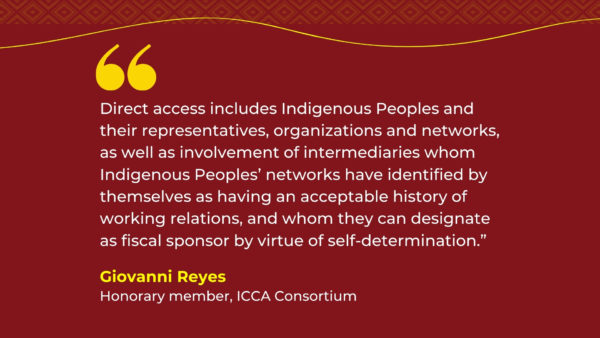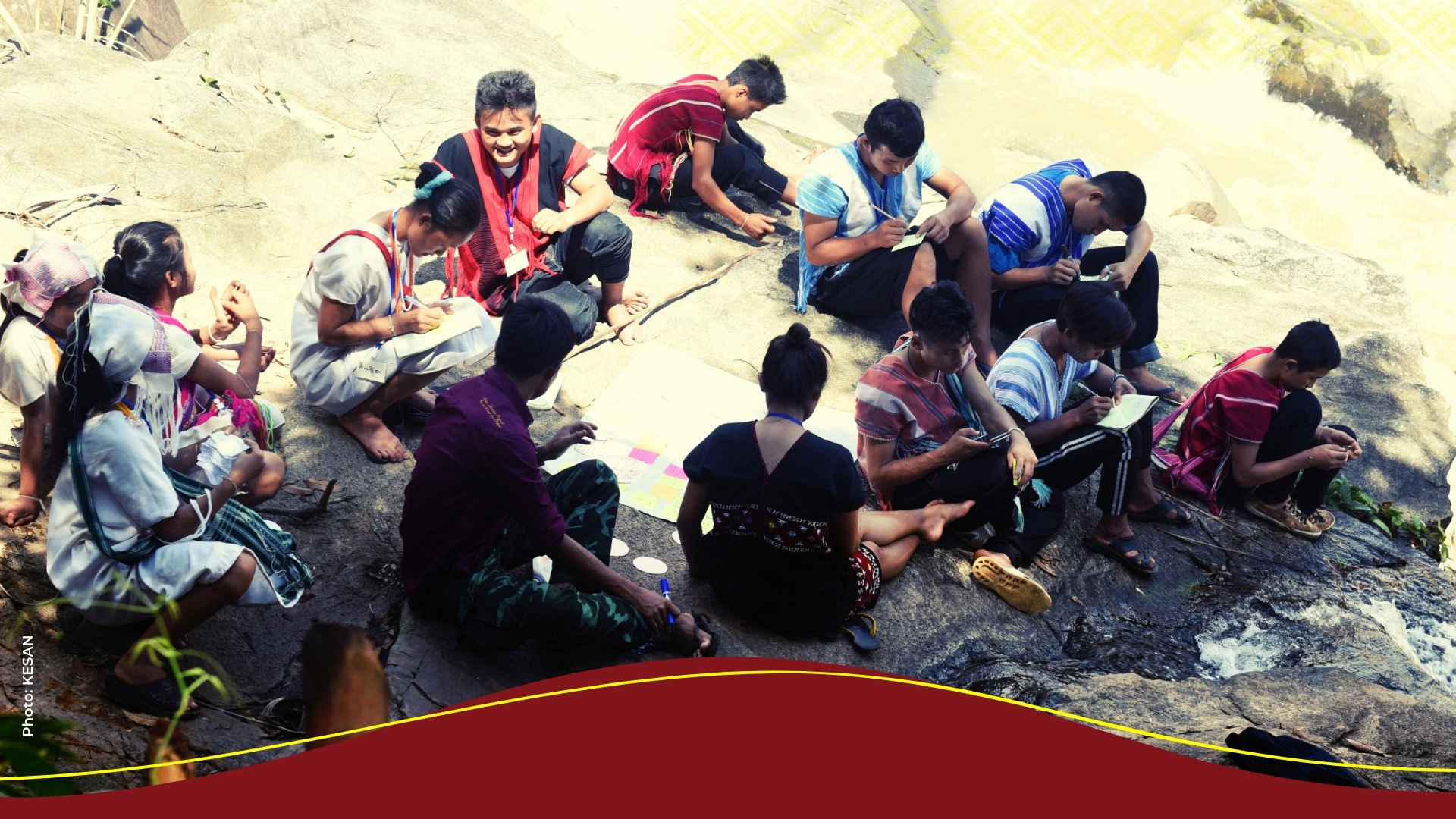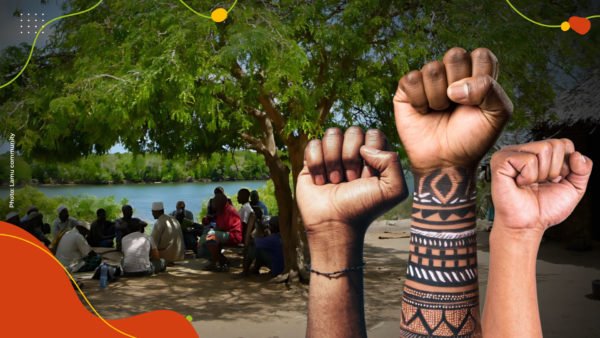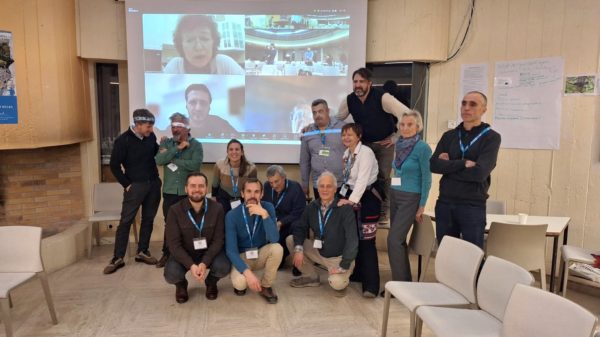Members and allies of the ICCA Consortium commemorate the International Day of the World’s Indigenous Peoples 2025
First published on 09/12/2025, and last updated on 02/26/2026
By ICCA Consortium
The observance of the International Day of the World’s Indigenous Peoples (August 9) serves to promote international awareness, advocacy, and action on issues that are important to Indigenous Peoples. This year, the ICCA Consortium organized an online meeting on August 7 to commemorate the day.
Intersections of financing, Artificial Intelligence (AI), and ancient knowledge: a conversation starter
The discussion at the meeting was moderated by the ICCA Consortium’s Defending and Rights Coordinator, Pooven Moodley, who framed the debate around the interconnectedness of technological shifts happening at present, the persistent threats and violence against Indigenous Peoples, and the critical role ancient knowledge and Indigenous wisdom play and can continue to play as we collectively shape the future.
The moderator began with a reminder that the meeting was an open space for informal discussions to explore the intersections of financing, AI, and ancient knowledge. He then followed this up with powerful questions that served as conversation starters, with each question leading the participants to reflect deeply on what the different intersections and relationships between land, community, and wisdom mean in relation to how we walk forward through various crises.
Pooven inspired the participants to ask critical questions related to the power dynamics in inadequate and unfair financing, such as who benefits from the shifts that are happening, and who gets left behind. He warned about the impact of such forces on disadvantaged communities and emphasized the need to safeguard future generations against the irreversible consequences of unsustainable actions.
Indigenous-led conservation: direct financing as key to funding the future
As the first speaker, Giovanni Reyes (honorary member), an Indigenous leader from the Philippines and Chairperson of the Global Environment Facility’s Indigenous Peoples’ Advisory Group, shared his reflections on funding and financing territories of life. Giovanni began by stating that engagement with donors and multilateral bodies requires Indigenous Peoples and their representatives to “amplify the need for a shift in financing perspectives—from patronizing approaches to ones based on recognition and respect.” A key argument for this shift is the enormous contribution of Indigenous Peoples to biodiversity and climate resilience. Pointing out the irony that those who contribute significantly to conservation are the ones receiving the least funding, he advocated for direct access to funds that should be aligned with upholding the rights of Indigenous peoples.
“Direct access includes Indigenous Peoples and their representatives, organizations and networks, as well as involvement of intermediaries whom Indigenous Peoples’ networks have identified by themselves as having an acceptable history of working relations, and whom they can designate as fiscal sponsor by virtue of self-determination,” Giovanni explained. He cited bureaucratic and inflexible donor requirements as key challenges in funding, along with the presence of intermediaries who have no history or experience of working with Indigenous peoples’ communities.
Giovanni also mentioned specific examples, such as experience with the Global Environmental Facility’s Small Grants Programme (GEF SGP), which enabled communities to access funds and implement initiatives of their choice in their territories. He highlighted donors who operate on a trust-based funding model as key to providing direct access to funding in support of territories of life, especially those facing risks and dangers related to human rights violations. Giovanni concluded his intervention on a hopeful note, mentioning that despite numerous challenges faced, “Indigenous Peoples must remain as CEOs of the planet’s biodiversity landscape.”

Hanieh Moghani, ICCA Consortium’s Regional Coordinator for West and Central Asia and the Caucasus, spoke next and presented a broad introduction that traced the journey of Indigenous Peoples within the institutions and processes of the United Nations (UN). She highlighted the foundation of Indigenous rights and the mechanisms that exist today, which have been built through decades of advocacy.
Hanieh then traced the evolution of Indigenous Peoples’ participation within the UN systems, from marginalized subjects to recognized Peoples with distinct rights. She presented a detailed description of the three primary UN mechanisms dedicated to Indigenous Peoples: the United Nations Permanent Forum on Indigenous Issues, the Expert Mechanism on the Rights of Indigenous Peoples, and the Special Rapporteur on the rights of Indigenous Peoples, all of which consistently emphasize the importance of direct and decolonized financing. She concluded her presentation with a call to support direct funding for Indigenous Peoples.
Of current systems and alternatives: navigating the future in a shifting world
Pooven further contemplated Hanieh’s intervention, noting the historical nuances of Indigenous Peoples’ journey in navigating available legal spaces. He also reflected on the emergence of alternatives, further illuminating this by sharing his experience of being in a gathering with many Indigenous elders and activists, who used the analogy of a canoe to contemplate the actions required during these critical times.
“The canoe we are in is collectively falling apart, leaking, and with some passengers being pushed overboard. People are busy fixing the canoe, steering it in a different direction, and at the same time, are preoccupied with navigating strong currents, and may possibly be heading towards a crash quite soon. What is to be done in this situation? We keep doing our best to protect what we have to protect, but at the same time, it’s important to launch a new one as this one is coming apart, or we all collapse in this current canoe we are in.”
He further encouraged the participants to reflect more deeply on what it means to “set a course or new pathway based on knowledge that can take us in the direction of bridging the modern and ancient.”
Mohammad Arju, Communications and Advocacy Coordinator of the ICCA Consortium, was then called on by the moderator to briefly share his observations on AI, in line with the year’s official theme of “Indigenous Peoples and AI: Defending Rights and Shaping Futures.” Arju shared that in recent years, some conservation groups have begun advocating for the use of AI in nature conservation governance. Noting that the guardian and custodian communities of territories of life do not consider AI to be a top priority, he foresees that members of the ICCA Consortium will likely have to address challenges that come with the introduction of AI in nature governance.
Arju further shared that most AI-based systems are built without any input from Indigenous Peoples. There is a risk of misusing data and identities, as well as reinforcing existing biases, particularly in decision-making processes. Massive resources are also required to operate data centers for AI to carry out its processes, which is another factor to consider when evaluating the costs and benefits of AI.
Sharing stories, exchanging ideas
During the open forum, participants underscored the need for Indigenous communities to engage with new technologies while rigorously protecting their knowledge and rights. Paul Saing’eu, Regional Coordinator for East Africa, shared that many Indigenous communities still lack basic institutional education about modern technology, despite the widespread use of consumer technology, such as smartphones. He emphasized the urgent need to raise more awareness and to protect Indigenous identities and data.
Terence Hay-Edie, an honorary member of the Consortium, discussed initiatives such as Nature ID, which was inspired by the Whanganui River case in New Zealand, where Indigenous Peoples gained recognition as guardians. He also mentioned emerging networks, such as the Indigenous Data Network and the Biodiversity Credits Alliance’s Indigenous working group, which aim to compensate Indigenous Peoples for their stewardship of nature. He also shared an example from communities in Ecuador who are utilizing technologies such as camera traps and sound recordings to document biodiversity and defend their land rights. Finally, he noted that UNDP’s Small Grants Programme will soon launch calls for proposals for the next round of the ICCA-GSI, focusing on innovative community-led technologies for biodiversity monitoring.
Karen Wong, an honorary member, shared insights into her work on integrating diverse knowledge systems and research into rights of nature initiatives. She shared information about an upcoming workshop organized by the Intergovernmental Panel on Climate Change on engaging diverse knowledge systems, including Indigenous knowledge systems. Part of the discussions would focus on developing ethical frameworks for the use of AI, and it was noted that creating synergies and continuing the exchange of information would be beneficial.
Pooven closed the segment by raising a concern about intellectual property and how pharmaceutical companies are attempting to trademark derivatives of traditional knowledge without proper recognition of Indigenous peoples as knowledge holders. He also shared information about Awana Digital, a group that partners with earth defenders to co-develop technology for social justice. One of them is Mapeo, an open-source tool that has also been used for mapping ICCAs—territories of life.
Looking ahead
The meeting concluded with closing remarks from invited speakers and guests. There was a call for strengthened collaboration and actions on peer learning and knowledge exchange. Members were also asked to contribute to the upcoming volume, “Financing territories of life.” Follow-up discussions around AI and Indigenous data sovereignty were also mentioned as a way forward to continue the conversations started during the meeting.
The ICCA Consortium’s commemoration of the International Day of the World’s Indigenous Peoples underscored our core mission of championing the recognition and support for territories of life and their Indigenous guardians. The vibrant discussions reinforced the vitality of Indigenous knowledge and the power of community-led action to drive sustainable, transformative change.
Note: Recap of the meeting is reported by Diana San Jose



